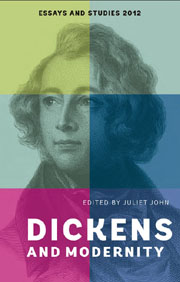Book contents
- Frontmatter
- Contents
- LIST OF ILLUSTRATIONS
- ACKNOWLEDGEMENTS
- NOTES ON THE CONTRIBUTORS
- INTRODUCTION
- 1 THE DICKENS TAPE: AFFECT AND SOUND REPRODUCTION IN THE CHIMES
- 2 DICKENS, SEXUALITY AND THE BODY; OR, CLOCK LOVING: MASTER HUMPHREY'S QUEER OBJECTS OF DESIRE
- 3 TEXTS, PARATEXTS AND ‘E-TEXTS’: THE POETICS OF COMMUNICATION IN DICKENS'S JOURNALISM
- 4 CORPUS STYLISTICS – DICKENS, TEXT-DRIVENNESS AND THE FICTIONAL WORLD
- 5 THINGS, WORDS AND THE MEANINGS OF ART
- 6 DICKENS AND THE CIRCUS OF MODERNITY
- 7 THE OLIVER! PHENOMENON; OR, ‘PLEASE, SIR, WE WANT MORE AND MORE!’
- 8 ‘WOW! SHE'S A LESBIAN. GOT TO BE!’: RE-READING/RE-VIEWING DICKENS AND NEO-VICTORIANISM ON THE BBC
- 9 OUT OF PLACE: DAVID COPPERFIELD'S IRRESOLVABLE GEOGRAPHIES
- 10 AFTERWORD: THE 2012 BICENTENARY
- Index
6 - DICKENS AND THE CIRCUS OF MODERNITY
Published online by Cambridge University Press: 05 February 2013
- Frontmatter
- Contents
- LIST OF ILLUSTRATIONS
- ACKNOWLEDGEMENTS
- NOTES ON THE CONTRIBUTORS
- INTRODUCTION
- 1 THE DICKENS TAPE: AFFECT AND SOUND REPRODUCTION IN THE CHIMES
- 2 DICKENS, SEXUALITY AND THE BODY; OR, CLOCK LOVING: MASTER HUMPHREY'S QUEER OBJECTS OF DESIRE
- 3 TEXTS, PARATEXTS AND ‘E-TEXTS’: THE POETICS OF COMMUNICATION IN DICKENS'S JOURNALISM
- 4 CORPUS STYLISTICS – DICKENS, TEXT-DRIVENNESS AND THE FICTIONAL WORLD
- 5 THINGS, WORDS AND THE MEANINGS OF ART
- 6 DICKENS AND THE CIRCUS OF MODERNITY
- 7 THE OLIVER! PHENOMENON; OR, ‘PLEASE, SIR, WE WANT MORE AND MORE!’
- 8 ‘WOW! SHE'S A LESBIAN. GOT TO BE!’: RE-READING/RE-VIEWING DICKENS AND NEO-VICTORIANISM ON THE BBC
- 9 OUT OF PLACE: DAVID COPPERFIELD'S IRRESOLVABLE GEOGRAPHIES
- 10 AFTERWORD: THE 2012 BICENTENARY
- Index
Summary
It is widely acknowledged that, on the basis above all of A Christmas Carol, Dickens had a hand in the invention of modern Christmas. I want here to put forward a lesser but not unconnected claim, the exploration of which brings into focus an equally rich and international cultural context. During my childhood in London in the years immediately following the Second World War, Christmas meant a great deal to me, as a time of then uncharacteristic cornucopia, of plentiful food and drink, present-giving and entertainment. Two Dickensian forms of the latter were de rigueur in my family: a visit to the pantomime at Golders Green Hippodrome, and above all my highlight of highlights, a visit to Bertram Mills's circus at Olympia.
Bertram Mills's circus originates from 1920, that is to say from the aftermath of another cataclysmic war, when likewise ‘normality’ gradually returned, and with it, a renewed and heightened craving for diversion and entertainment. Mills himself was a well-connected member of British society's upper crust, and he hoped to make money by filling expensive seats as well as cheap ones. So he garnered support from people like Winston Churchill and Ramsay MacDonald to try to overcome a traditional distaste for the circus amongst the middle and upper classes which we shall encounter here more than once. That the tide was already turning, at least in some sections thereof, might be shown by the fact that many of the ‘Bloomsberries’ were circus devotees.
- Type
- Chapter
- Information
- Dickens and Modernity , pp. 133 - 149Publisher: Boydell & BrewerPrint publication year: 2012



